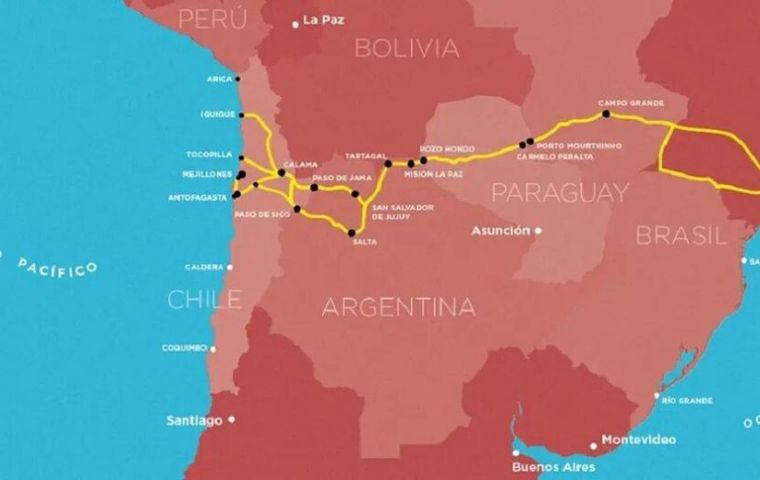MercoPress. South Atlantic News Agency
Bi-oceanic corridor feared to hamper Montevideo Port's future
 Montevideo is expensive and Uruguay is a small country, Pozzi explained
Montevideo is expensive and Uruguay is a small country, Pozzi explained Uruguayan National Port Administration's (ANP) representative at the River Plate Basin Terminal (TCP), Jorge Pozzi, raised concerns Tuesday during a radio interview about the future of Montevideo's port. In his view, the proposed Pacific-Atlantic bioceanic corridor, connecting Brazil with Chile or Peru, could bypass Uruguay entirely, significantly impacting its system, economy, and thousands of workers.
The possible loss of all Paraguayan Traffic represents almost 48% of Montevideo's container movement, and its diversion to Brazilian or Buenos Aires ports would be a severe blow. “The issue is much more delicate than it seems,” Pozzi told Radio Carve.
In addition, the initiative represents stalling any TCP expansion. Presently, a key project entrusted to Jan De Nul, aimed at doubling berthing capacity, is significantly behind schedule due to technical difficulties with contractors, potentially delaying completion until 2027 and leaving 200 workers unemployed.
Despite advantages like operational speed and channel depth, Montevideo is still perceived as expensive compared to competitors, leading shipping companies to seek more cost-effective options.
Pozzi also touched on the controversial dual role of the ANP as both regulator and operator, acknowledging it's an “old discussion” that might need correction.
He emphasized the importance of regaining Paraguayan traffic and maintaining a strong position in the container business, given the concentrated global shipping market where major companies prioritize cargo availability over national consultation.
The departure of shipping companies such as MSC and the reconfiguration of routes that prioritize ports in Brazil or Buenos Aires left Montevideo off the map. “It's not the first time this has happened, but the blow was very hard. We have to see how we can reverse it because this affects the entire maritime world: operators, dispatchers, workers,” he explained.
Although Montevideo has advantages to offer, “Uruguay is a small country, so if we don't pay attention, the bi-oceanic corridor connecting Brazil with Chile or Peru could leave us out,” Pozzi insisted. “The port of Montevideo moves a lot of money and employment. The problem is that we are expensive, and shipping companies go where it suits them,” he warned. “Today there are 10 large shipping companies in the world. They do not consult with countries. Wherever there is cargo, they go,” he said.




Top Comments
Disclaimer & comment rulesCommenting for this story is now closed.
If you have a Facebook account, become a fan and comment on our Facebook Page!